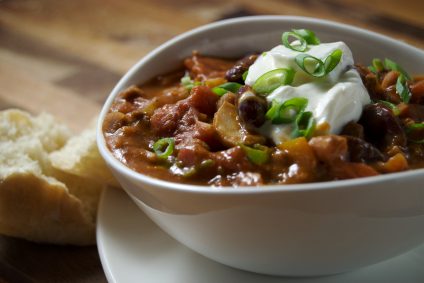8 foods to fuel your winter activities
Give your body the energy it needs before and after winter exercise with this nutrition and healthy-eating tips

Source: Web exclusive: November 2009
The foods you need for winter fitness
Did you know that it’s important to eat a little different to sustain energy during exercise in the winter? Kelly Anne Erdman, a registered dietitian and consultant to Winter Olympics athletes at the Canada Sports Centre in Calgary, says that while we need a combination of carbohydrate, protein and fat at every meal, we need to eat foods that are slightly higher in fat and protein about two to three hours before being active in the winter.
‘Food warms up our core temperature. And your muscles work better when they are warm," she says. "Eating a little more will slow down the rate food leaves the stomach, sustaining your energy longer in the cold.’ You also need a snack containing carbohydrate and protein within the first 30 minutes post-exercise to fuel your muscles and help them recover. Otherwise, the next day when you hit the slopes, you won’t have as much energy, adds Erdman. A few hours later you need a complete healthy meal.
And don’t forget to hydrate just because it’s cold. Winter athletes are notorious for avoiding fluids on the slopes to avoid the hassle of bathroom breaks in full attire, but staying properly hydrated helps maintain endurance and power output. ‘Drink two cups of fluid two hours before exercise, and another one to two cups shortly before hitting the slopes,’ says Erdman. The same goes for afterwards. Here are a few suggestions to help you stay nourished while enjoying your favourite winter sports and the healthiest foods winter has to offer.
Foods to enjoy before you exercise
Oatmeal and walnuts with cinnamon
Hearty oatmeal is a complex carbohydrate, rich in soluble fibre (which takes longer to digest, giving you more energy longer) and protein. Add walnuts for more protein and a healthy (unsaturated) fat, says Erdman. Finally, sprinkle the rib-sticking warm cereal with spicy cinnamon, which contains immune-boosting antioxidants to help fend off winter viruses, according to Janine Bowring, a naturopath in Woodbridge, Ont.
Citrus fruit salad with yogurt and honey
Winter fruits such as oranges and grapefruits contain vitamin C, which helps boost the immune system. Their natural fibre, combined with the protein in the yogurt, will sustain energy levels. And finally, honey is a terrific natural sweetener with antioxidant and antibacterial properties.
Chocolate protein shake
Cocoa is one the best winter foods out there (it’s delicious and loaded with antioxidants): check out our recipe for the ultimate cocoa power shake, provided by Toronto-based personal trainer and gourmet chef Frank Mastromattei. Just pop the following in your blender:
‘ 1 scoop of chocolate protein powder
‘ 1 tsp (5 mL) of peanut butter or almond butter
‘ 1 tsp (5 mL) honey
‘ 1 tsp (5 mL) of cocoa powder
‘ 1 banana
‘ 1 cup (250 mL) of non-fat soymilk
‘ 4 ice cubes
Chai or herbal tea
‘Winter sports enthusiasts are less inclined to crave cold water on cold days,’ says Bowring. So make sure you fill up on fluids with warm caffeine-free chai or herbal teas.
Foods to enjoy after you exercise
Homemade hot chocolate
Hydrate and refuel immediately after exercise with homemade hot chocolate (made with skim milk, 100 percent cocoa and sweetened to taste) in an insulated Thermos. The milk will give you a pop of protein and carbohydrate; the cocoa, antioxidants.
Chili
Make a crock-pot of homemade chili for the whole family to feed on post-exercise. Use ground turkey or chicken for a lean source of protein. The beans are a nutritional powerhouse; loaded with soluble fibre and protein, they provide lasting nourishment and energy, says Erdman. (Check out our collection of chili recipes to get you started.)
Turkey sandwich
Skinless turkey is an excellent lean source of protein (and abundant during the holidays). ‘Make it with whole-grain bread for soluble fibre,’ adds Erdman. Throw in partly skimmed mozzarella for additional protein and a healthy fat.
Sweet potato and corn chowder
Sweet potatoes are all-round winter superstars’a complex carbohydrate that sustains energy longer, loaded with beta-carotene, a powerful antioxidant. Plus, all root vegetables are ‘warming’ foods in traditional Chinese medicine, says Bowring. ‘Eating ‘hot’ foods when it is cold will help keep you warm,’ she explains.
Try some of these recipes, too:
‘ Warm Sweet Potato and Kale Salad
‘ Beef and Sweet Potato Stir-fry
‘ Turkey, Brie and Apple Sandwich on Raisin-Walnut Bread
‘ Chocolate Almond Smoothie
‘ Baked Salmon with Citrus Salad
Don’t miss out! Sign up for our free weekly newsletters and get nutritious recipes, healthy weight-loss tips, easy ways to stay in shape and all the health news you need, delivered straight to your inbox.




